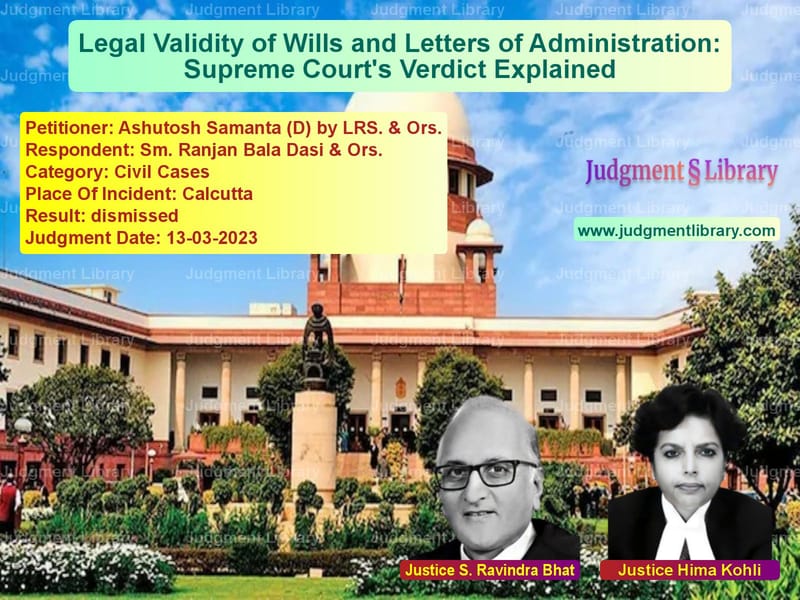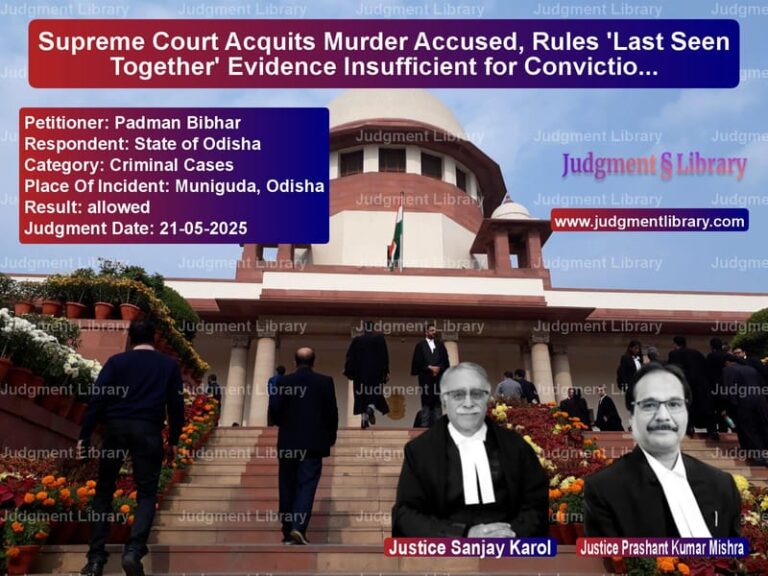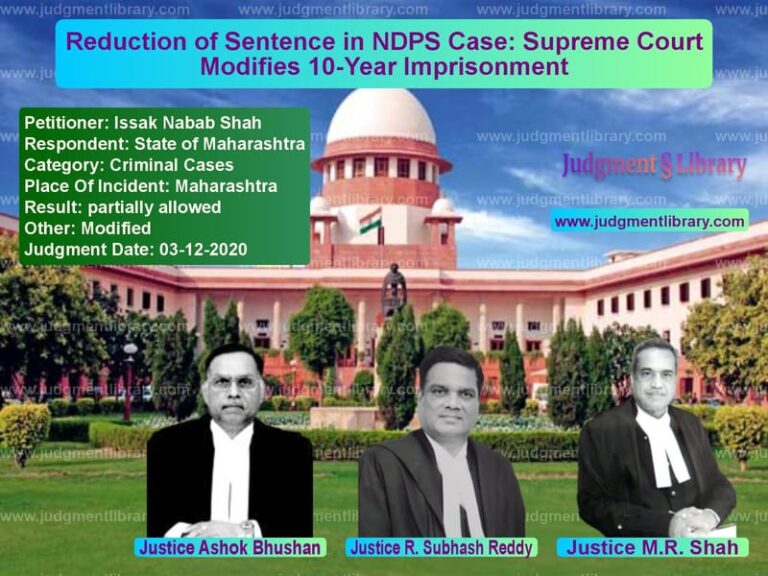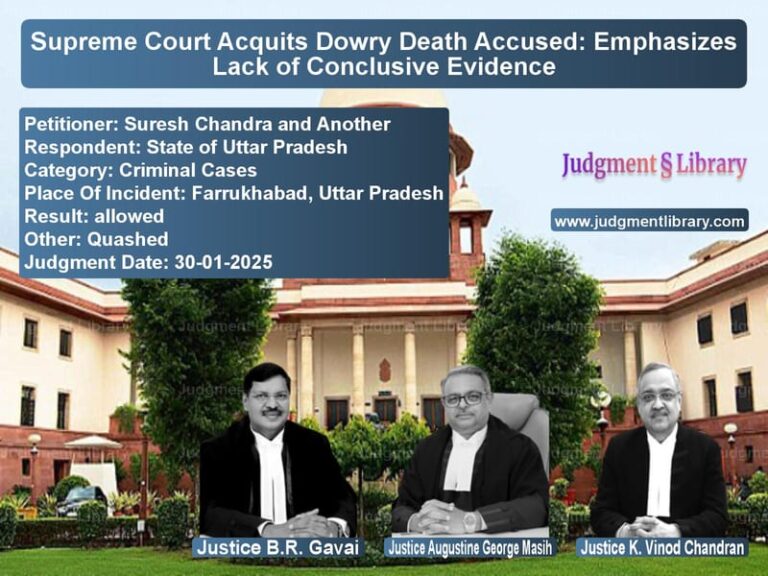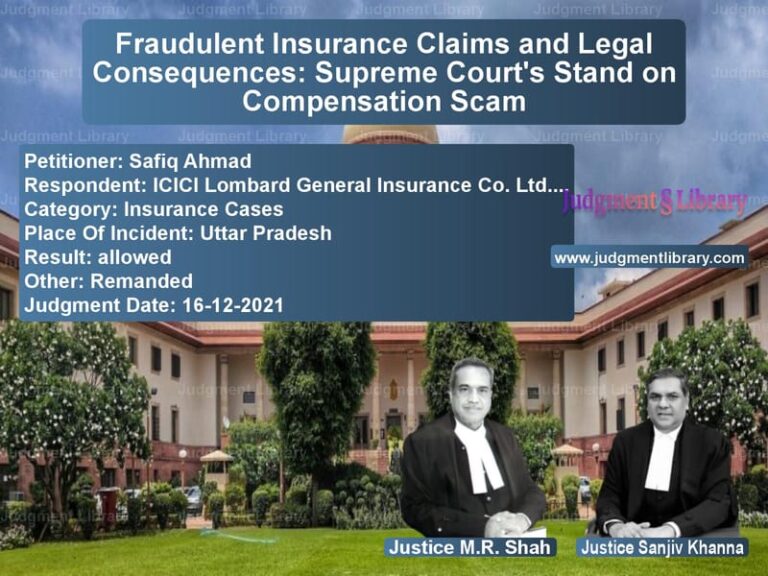Legal Validity of Wills and Letters of Administration: Supreme Court’s Verdict Explained
The case of Ashutosh Samanta (D) by LRS. & Ors. v. Sm. Ranjan Bala Dasi & Ors. deals with an important legal question regarding the validity of a will and the grant of letters of administration under the Indian Succession Act, 1925. The dispute centers around a will executed by Gosaidas Samanta, who had three sons and left behind a will in 1929. The main issue before the court was whether the will was properly executed and whether the claim for letters of administration was maintainable.
The case has been subject to multiple rounds of litigation, beginning with a partition suit in 1952. The appellant, a purchaser of a portion of the disputed properties, contested the grant of letters of administration on various grounds, including delay and lack of proper execution of the will.
Background of the Case
The testator, Gosaidas Samanta, had three sons: Upendra, Anukul, and Mahadev. Upon his death, his will bequeathed his estate to two of his sons, Anukul and Mahadev, and his grandson Shibu (son of Upendra). Upendra was not given any share in the will. In 1945, a partition deed was executed between the three beneficiaries, and Upendra executed a disclaimer document regarding the properties sold by Shibu.
In 1952, a suit for partition and possession was filed by the present appellant, who claimed ownership of some of the properties by virtue of a purchase from Upendra. However, the suit was dismissed on the grounds that the appellant had no title to the properties. An appeal resulted in a preliminary decree for partition, but the High Court later ruled that the will had never been probated and no letters of administration had been sought.
Arguments by the Parties
Arguments by the Appellant
The appellant, represented by Mr. Ranjan Mukherjee, argued that:
- The courts below erred in relying on the will and granting letters of administration without concrete proof of execution.
- The existence of suspicious circumstances surrounding the execution of the will created doubts about its authenticity.
- The courts should not have relied on Section 90 of the Evidence Act, 1872, which presumes the authenticity of documents older than 30 years.
- There was an excessive delay in filing the petition for letters of administration, which should have been a ground for rejection.
Arguments by the Respondent
The respondent, represented by Mr. Bikash Kar Gupta, countered that:
- The courts had consistently upheld the validity of the will, and the findings should not be interfered with.
- The will was duly proved by available evidence, including depositions of witnesses.
- The trial court relied on relevant documents, including the 1945 partition deed, which referred to the will.
Legal Analysis by the Supreme Court
The Supreme Court examined the following legal aspects:
Applicability of Section 90 of the Evidence Act
The appellant contended that Section 90 of the Evidence Act, 1872, which presumes the authenticity of documents over 30 years old, was incorrectly applied. The Supreme Court, referring to the judgment in M.B. Ramesh v. K.M. Veeraje Urs, ruled that wills cannot be proved merely by presumption under Section 90. Instead, they must comply with Section 63(c) of the Indian Succession Act, 1925, and Section 68 of the Evidence Act, 1872.
Proof of Execution in the Absence of Attesting Witnesses
Since both attesting witnesses had passed away, the respondents relied on depositions from the testator’s sons and another witness, Surendra Nath Bhowmick, who confirmed seeing the testator sign the will. The court ruled that when attesting witnesses are unavailable, Section 69 of the Evidence Act allows proof through other evidence, such as handwriting verification.
Section 69 and 71 of the Evidence Act
The court cited precedents in Babu Singh v. Ram Sahai and K. Laxmanan v. Thekkayil Padmini, affirming that a will can still be proved even if attesting witnesses are unavailable, provided sufficient evidence supports its authenticity.
Conclusion by the Supreme Court
The court found that:
- The will had been sufficiently proved through witness testimonies and corroborating documents.
- The partition deed of 1945 and the document executed by Upendra acknowledging the will further confirmed its validity.
- No heirs of Upendra contested the letters of administration.
Accordingly, the Supreme Court dismissed the appeal and upheld the findings of the lower courts.
Implications of the Judgment
This judgment reiterates the principle that wills cannot be presumed valid solely based on age. Instead, compliance with legal requirements under the Indian Succession Act and the Evidence Act is essential. The ruling also highlights the importance of letters of administration in disputes over property rights.
Petitioner Name: Ashutosh Samanta (D) by LRS. & Ors..Respondent Name: Sm. Ranjan Bala Dasi & Ors..Judgment By: Justice S. Ravindra Bhat, Justice Hima Kohli.Place Of Incident: Calcutta.Judgment Date: 13-03-2023.
Don’t miss out on the full details! Download the complete judgment in PDF format below and gain valuable insights instantly!
Download Judgment: ashutosh-samanta-(d)-vs-sm.-ranjan-bala-dasi-supreme-court-of-india-judgment-dated-13-03-2023.pdf
Directly Download Judgment: Directly download this Judgment
See all petitions in Succession and Wills
See all petitions in Property Disputes
See all petitions in Judgment by S Ravindra Bhat
See all petitions in Judgment by Hima Kohli
See all petitions in dismissed
See all petitions in supreme court of India judgments March 2023
See all petitions in 2023 judgments
See all posts in Civil Cases Category
See all allowed petitions in Civil Cases Category
See all Dismissed petitions in Civil Cases Category
See all partially allowed petitions in Civil Cases Category

